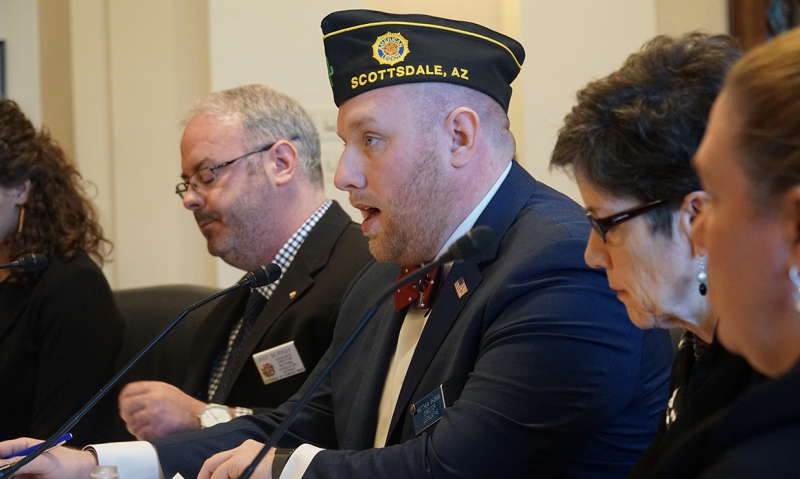
Legion testifies on president’s proposed 2019 budget for VA
On The American Legion’s 99th birthday, March 15, American Legion National Legislative Division Director Matthew Shuman testified before the House Health Subcommittee regarding the president’s 2019 Department of Veterans Affairs (VA) budget request for the Veterans Health Administration.
“The American Legion appreciates the president following through with the promises he made on the campaign trail – to take care of those who have served the United States in uniform,” Shuman said. “At a time when most federal agencies are experiencing a decrease in their respective budgets, the VA will hopefully, with assistance from this critical committee, receive a much-needed increase.”
Shuman said the 2019 budget, which is a $12.1 billion increase above last year’s request, is reflective of veterans’ voices and should encourage Congress to invest in the largest integrated medical system not only in the United States, but in the world.
In reviewing the VA’s proposed budget, Shuman addressed several critical areas which include community care, creating a lifetime Electronic Health Records (EHR) system, eradicating veteran homelessness and the Legion's opposition to rounding down the cost-of-living adjustment (COLA).
Community care
According to Shuman’s written statement, the veteran community learned from the 2014 Phoenix VA wait time scandal that there is a need for care in the community. He said the number of veterans who desired to receive care in the community skyrocketed after the Choice Act was passed and signed into law.
In addition, Shuman said a large percentage of veterans, many of whom are members of The American Legion, preferred to receive medical services closer to their homes. The need to finally streamline multiple programs into one effective system is vital, especially as current funding may run dry in May.
“Streamlining the many programs into one is cost-effective, efficient and most importantly, it’s common sense,” Shuman said. “Following through with the promises he made, President Trump’s budget requests funding to ensure veterans receive the best care possible – be it at the VA or in their community.
In order for this to happen, Shuman said Congress must take action to join and modify the programs for the benefit of all veterans utilizing the VA’s Community Care program.
Creating a lifetime EHR
Like streamlining community care, Shuman said restricting the VA’s EHR system to be the same as that of the Department of Defense (DoD) is common sense. Having one seamless system will aid servicemembers as they transition from the military and become veterans.
“The president’s proposed budget not only calls for funding to be allocated, but also requests that those funds be placed in a separate account for VA to obtain the same EHR system that the DoD is employing,” he said.
Because of its efforts, advocacy and resolution, Shuman said the Legion supports the president’s budget request and appreciates the investment he is making in the VA and its community care programs, with the intent to streamline and unify.
“The president’s budget echoes VA Secretary David Shulkin’s desire to expand mental health care access for those with other-than-honorable discharges, which falls in line with the executive order President Trump signed,” Shuman said. “With the support of this committee, it can finally happen.”
Veteran homelessness
Shuman said the need to eradicate veteran homelessness, which has been a substantial priority for The American Legion for many years, is crucial as there are roughly 40,000 homeless veterans living on the streets of America today.
“That is not acceptable by The American Legion, and I imagine, by this committee,” he said.
According to Shuman, the president’s proposed budget calls to sustain funding levels for the Supportive Services for Veteran Families (SSVF) program, a program he said will assist multiple nonprofit organizations like The American Legion in their efforts to end homelessness within the veteran community.
By Resolution No. 340, the Legion calls upon Congress to make the SSVF program permanent and increase funding to end the plague of veteran homelessness. Shuman said SSVF is the only national, veteran-specific program to help at-risk veterans avoid becoming homeless, and provide rapid re-housing for those who lose their housing.
“The American Legion appreciates the president’s desire to maintain the level of funding, but highly encourages this committee to make the SSVF program permanent, along with increase the funding for this critical program,” Shuman said. “This would send a clear message that this committee and Congress wants to end this horrific plague within the veteran community.”
Opposing COLA round-downs
By Resolution No. 164, the Legion has long opposed the rounding down of COLA. Asking veterans to reduce their benefits to pay for the benefits of other veterans is unethical and a textbook example of "robbing Peter to pay Paul," according to Shuman.
“We understand that $12 is not a lot of money to some but to others, it is,” he said. “We understand that some veterans have proudly declared they would happily give it up to help other veterans – and that only speaks to the character of those that this committee, and The American Legion, aims to help.”
Shuman said The American Legion urges Congress to oppose any form of reducing benefits for veterans. The Legion appreciates the president’s 2019 proposed VA budget increase and looks forward to engaging with Congress, as well as VA officials, to ensure those funds are used appropriately for the benefit of all veterans.
